Ecumenism
 |
 |
 |
 |
 |
 |
 |
Müller, Protestants & Justification
Archbishop Gerhard Müller, the head of the Congregation for the Doctrine of the Faith, believes that the Protestants are already part of the Church. On October 11, 2011, in a speech in homage of Protestant “bishop” Johannes Friedrich in Bavaria, Archbishop Müller said these words:
“Baptism is the fundamental sign that sacramentally unites us in Christ, and which presents us as the one Church before the world. Thus, we as Catholic and Evangelical Christians are already united even in what we call the visible Church. Strictly speaking, there are not several Churches, one beside the other – rather these are divisions and separations within the one people and house of God.” (news report here)
Now, if the Protestants are already in the one Catholic Church, they do not need to convert. Thus, according to Müller, Protestantism is enough to save their members and bring them to Heaven. Indirectly, therefore, the doctrine of justification enters the stage again.
This is what gives new momentum to this article by Dr. Robert Banaugh. It is a part of larger study titled Destruction of the Traditional Faith that can be read here. Titles and sub-titles are ours. - The Editor
It seems that it is no longer a tenet of the Catholic Faith that works and deeds are required for salvation, because “one is now justified by faith alone.”
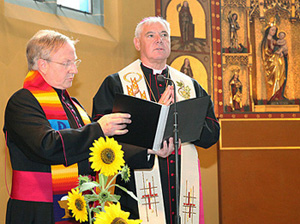 On October 31, 1999, officials from both the Catholic Church and the Lutheran World Federation signed the Joint Declaration on the Doctrine of Justification. When asked if Catholics can now say that individuals are justified by faith alone, Jeffrey Cross, a spokesman for the National Conference of Bishops, said: “Yes, in fact the text says that very clearly.”
On October 31, 1999, officials from both the Catholic Church and the Lutheran World Federation signed the Joint Declaration on the Doctrine of Justification. When asked if Catholics can now say that individuals are justified by faith alone, Jeffrey Cross, a spokesman for the National Conference of Bishops, said: “Yes, in fact the text says that very clearly.”
Nancy Frazier O’Brien of the Catholic News Service made a similar statement saying: “The signing marked the end of a long, sometimes difficult journey from mutual Lutheran-Catholic condemnations to agreement that justification and salvation come by faith alone.” (1)
Statements like these from conciliar Church officials - when bolstered by the facts that the accord was presented with great fanfare and Rome has not publicly or formally refuted it - implies in the eyes of the faithful that the Conciliar Church now teaches one is justified by faith alone.
Catholic teaching
The affirmations of the Lutherans that one is saved by faith alone were condemned at the Council of Trent in the 16th century. This was a dogmatic council whose deliberations were approved by Pope Paul III. The fact that the Catholic doctrine on justification must be adhered to for salvation was clearly stated in Session 6, chap. 16 of the Council:
“After this Catholic doctrine of justification - which, unless he faithfully and firmly accepts, no one can be justified – it seemed good to the holy Synod to add these canons, so that all may know, not only what they must hold and follow, but also what they ought to shun and avoid.”
A portion of this doctrine in the same session of the Council states:
“If anyone shall say that by faith alone the sinner is justified, so as to understand that nothing else is required to cooperate in the attainment of the grace of justification, and that it is no way necessary that he be prepared and disposed by the action of his own will: let him be anathema.”
The doctrine that works are necessary for justification was also reinforced at the Council of Trent, which stated:
“You see that by works a man is justified and not by faith alone” (James 2:24). (Session 6, chap. 10)
Ignoring past doctrine
The authors of the Joint Declaration wanted to emphasize that the condemnations of the Council of Trent are no longer in force. In fact, the Joint Declaration contains three sections stating exactly this. For example Section 41 of the Joint Declaration says:
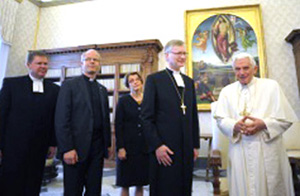 “Thus the doctrinal condemnations of the 16th century, that is the Council of Trent, insofar as they are related to the doctrine of justification, appear in a new light: The teaching of the Lutheran churches presented in this declaration does not fall under the condemnations from the Council of Trent.”
“Thus the doctrinal condemnations of the 16th century, that is the Council of Trent, insofar as they are related to the doctrine of justification, appear in a new light: The teaching of the Lutheran churches presented in this declaration does not fall under the condemnations from the Council of Trent.”
While Section 13 of the Joint Declaration states: “In light of this consensus, the corresponding doctrinal condemnations of the 16th century, the Council of Trent, do not apply to today’s partner.”
And Section 5 of the Joint Declaration says: “The present joint declaration does not cover all that either church teaches about justification; it does encompass a consensus on basic truths of the doctrine of justification and shows that the remaining differences are no longer the occasion for doctrinal differences.”
Since Section 26 of the Joint Declaration states, “According to Lutheran understanding, God justifies sinners by faith alone (sola fide), “ it is evident the Joint Declaration implies that sinners are justified by faith alone.
Imposing change on the Catholic Faith
The following three comments from the Joint Declaration expand on the Lutheran doctrine of sola fide.
Approved by JPII and Ratzinger
It should be noted that neither Pope John Paul II nor then Cardinal Joseph Ratzinger signed the declaration; however, neither individual has issued a public denial nor a disclaimer of the Joint Declaration. Moreover, both John Paul II and Cardinal Cassidy, who was the principal negotiator of the pact, have publicly endorsed it, and throughout the entire negotiations the Pope encouraged the process. (2)
In fact, Cardinal Cassidy affirmed that the declaration had been approved by the Congregation for the Doctrine of the Faith, headed by then Cardinal Ratzinger and by John Paul II. (3)
The role of Cardinal Ratzinger, now Pope Benedict XVI, was critical in the obtaining of the declaration as he is credited with “saving” the declaration when it appeared there would be no agreement. (4)
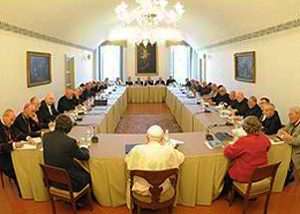 Protestant theologian Joachim Track listed the three fundamental concessions made by Cardinal Ratzinger that permitted the accord:
Protestant theologian Joachim Track listed the three fundamental concessions made by Cardinal Ratzinger that permitted the accord:

Posted October 10, 2012
“Baptism is the fundamental sign that sacramentally unites us in Christ, and which presents us as the one Church before the world. Thus, we as Catholic and Evangelical Christians are already united even in what we call the visible Church. Strictly speaking, there are not several Churches, one beside the other – rather these are divisions and separations within the one people and house of God.” (news report here)
Now, if the Protestants are already in the one Catholic Church, they do not need to convert. Thus, according to Müller, Protestantism is enough to save their members and bring them to Heaven. Indirectly, therefore, the doctrine of justification enters the stage again.
This is what gives new momentum to this article by Dr. Robert Banaugh. It is a part of larger study titled Destruction of the Traditional Faith that can be read here. Titles and sub-titles are ours. - The Editor
______________________
It seems that it is no longer a tenet of the Catholic Faith that works and deeds are required for salvation, because “one is now justified by faith alone.”

Muller on the Protestants: "We are the same Church"
Nancy Frazier O’Brien of the Catholic News Service made a similar statement saying: “The signing marked the end of a long, sometimes difficult journey from mutual Lutheran-Catholic condemnations to agreement that justification and salvation come by faith alone.” (1)
Statements like these from conciliar Church officials - when bolstered by the facts that the accord was presented with great fanfare and Rome has not publicly or formally refuted it - implies in the eyes of the faithful that the Conciliar Church now teaches one is justified by faith alone.
Catholic teaching
The affirmations of the Lutherans that one is saved by faith alone were condemned at the Council of Trent in the 16th century. This was a dogmatic council whose deliberations were approved by Pope Paul III. The fact that the Catholic doctrine on justification must be adhered to for salvation was clearly stated in Session 6, chap. 16 of the Council:
“After this Catholic doctrine of justification - which, unless he faithfully and firmly accepts, no one can be justified – it seemed good to the holy Synod to add these canons, so that all may know, not only what they must hold and follow, but also what they ought to shun and avoid.”
A portion of this doctrine in the same session of the Council states:
“If anyone shall say that by faith alone the sinner is justified, so as to understand that nothing else is required to cooperate in the attainment of the grace of justification, and that it is no way necessary that he be prepared and disposed by the action of his own will: let him be anathema.”
The doctrine that works are necessary for justification was also reinforced at the Council of Trent, which stated:
“You see that by works a man is justified and not by faith alone” (James 2:24). (Session 6, chap. 10)
Ignoring past doctrine
The authors of the Joint Declaration wanted to emphasize that the condemnations of the Council of Trent are no longer in force. In fact, the Joint Declaration contains three sections stating exactly this. For example Section 41 of the Joint Declaration says:

Meeting Finnish Lutherans in January 2012, Benedict praised the accord on justification
While Section 13 of the Joint Declaration states: “In light of this consensus, the corresponding doctrinal condemnations of the 16th century, the Council of Trent, do not apply to today’s partner.”
And Section 5 of the Joint Declaration says: “The present joint declaration does not cover all that either church teaches about justification; it does encompass a consensus on basic truths of the doctrine of justification and shows that the remaining differences are no longer the occasion for doctrinal differences.”
Since Section 26 of the Joint Declaration states, “According to Lutheran understanding, God justifies sinners by faith alone (sola fide), “ it is evident the Joint Declaration implies that sinners are justified by faith alone.
Imposing change on the Catholic Faith
The following three comments from the Joint Declaration expand on the Lutheran doctrine of sola fide.
- Section 15 of the Joint Declaration states: “Together we confess that we are accepted by God and we receive the Holy Spirit, who in our hearts, empowers us, and calls us to do good works, not on the basis of our merits but only through grace and faith in the salvific work of Christ.”
- Section 5 of the Joint Declaration affirms: “It [the Joint Declaration] does not cover all that either church teaches about justification; it does encompass a consensus on basic truths of the doctrine of justification and shows that the remaining differences in its explication are no longer the occasion for doctrinal condemnations.
- A portion of Section 13 of the Declaration says: “By appropriating insights of recent biblical studies and drawing on modern investigations of the History of theology and dogma, the post Vatican II ecumenical dialogue has led to a notable convergence concerning justification, with the result that this Joint Declaration is able to formulate a consensus on basic truths concerning the doctrine of justification. In light of this consensus, the corresponding doctrinal condemnations of the sixteenth century do not apply to today’s partner.”
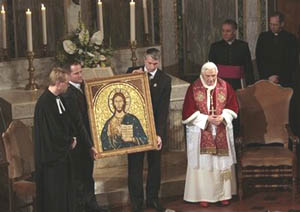
Benedict at the Lutheran temple in Rome
Approved by JPII and Ratzinger
It should be noted that neither Pope John Paul II nor then Cardinal Joseph Ratzinger signed the declaration; however, neither individual has issued a public denial nor a disclaimer of the Joint Declaration. Moreover, both John Paul II and Cardinal Cassidy, who was the principal negotiator of the pact, have publicly endorsed it, and throughout the entire negotiations the Pope encouraged the process. (2)
In fact, Cardinal Cassidy affirmed that the declaration had been approved by the Congregation for the Doctrine of the Faith, headed by then Cardinal Ratzinger and by John Paul II. (3)
The role of Cardinal Ratzinger, now Pope Benedict XVI, was critical in the obtaining of the declaration as he is credited with “saving” the declaration when it appeared there would be no agreement. (4)

At Castelgandolfo the plan to ask forgiveness from Protestants in 2017 was announced
- “First, he agreed that the goal of the ecumenical process is unity in diversity, not structural reintegration. This was important to many Lutherans in Germany, who worried that the final aim of this was coming back to Rome.
- Second, Ratzinger fully acknowledged the authority of the Lutheran World Federation to reach an agreement with the Vatican.
- Finally, Ratzinger agreed that while Christians are obliged to do good works, justification and Final Judgement remain God’s gracious acts.” (5)
- Apud Robert Sungenis, “Review of the Lutheran/Catholic Joint Declaration on Justification”
- John Vennari, “Pope John Paul II and the Lutheran Catholic Accord,” The Catholic Family News, July, 1999
- Atila S. Guimarães, “The October Revolution,” Tradition in Action
- John Allen, “Ratzinger Credited With Saving the Lutheran Pact,” The National Catholic Reporter, October 14, 1999
- A.S. Guimarães, “The October Revolution,”

Posted October 10, 2012
______________________
______________________
 Volume I |
 Volume II |
 Volume III |
 Volume IV |
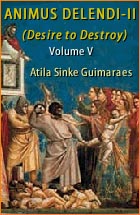 Volume V |
 Volume VI |
 Volume VII |
 Volume VIII |
 Volume IX |
 Volume X |
 Volume XI |
 Special Edition |


